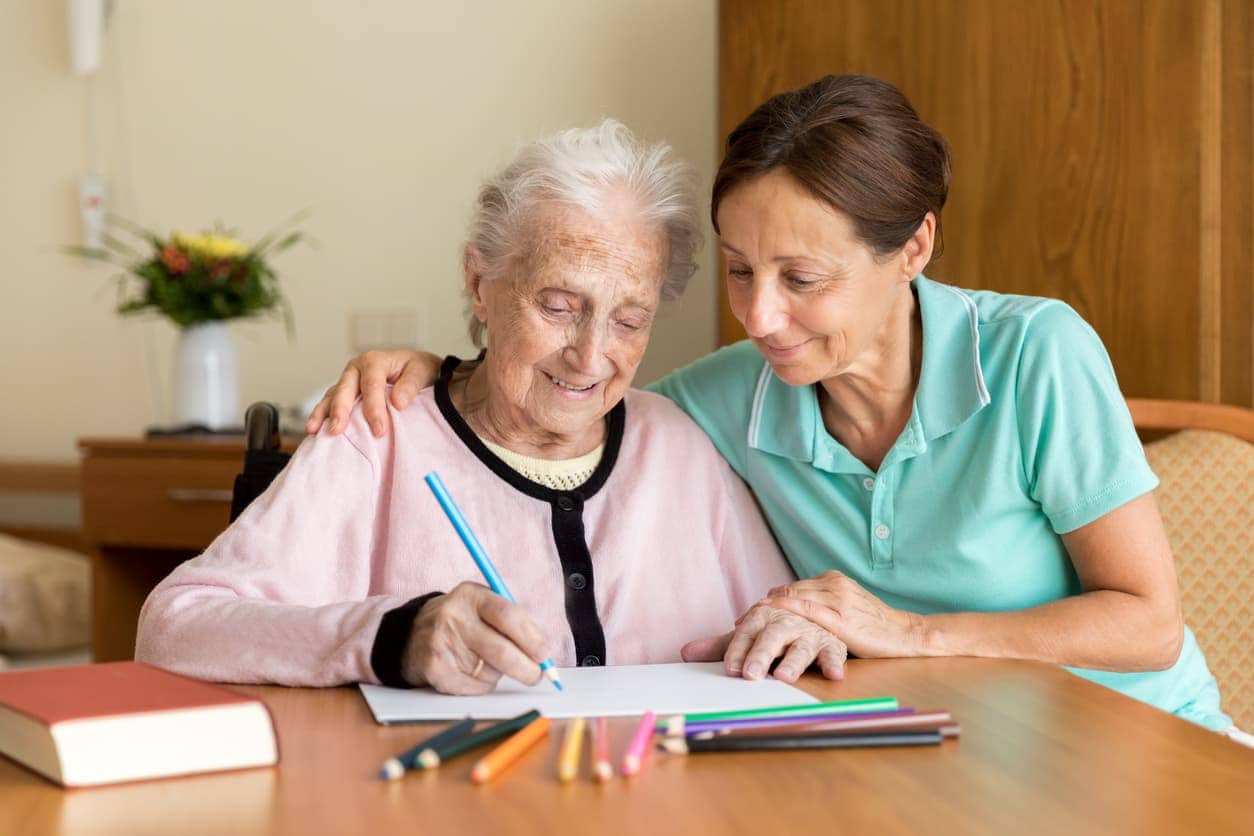
The Holidays and Dementia
The holidays are meant to be a happy time. Still, for families with a loved one suffering from dementia, the season can be a painful reminder of the things your loved one can no longer enjoy. Maybe Mom always made her famous Christmas cookies, and nobody can replicate her recipe. Or Dad always took the family to pick out the tree. These responsibilities may have passed to you since then, and it can feel overwhelming to make the holidays memorable for others while accommodating your loved one with dementia.
“One of the things that struck me early on was the times I wanted to ask my mom how to make her signature dishes, and I couldn’t. That really comes through during the holidays,” said Jane, whose mother suffers from Alzheimer’s Disease. “Mom (an artist) would also make beautiful table arrangements and had closets full of vases and decorations for the table. When she couldn’t do that anymore, it was a big loss.”
The holidays are also stressful because they come with additional tasks like shopping, cooking, and planning on top of our caregiving. Maybe family members disagree on how everyone should celebrate. In addition, the stress of the season can intensify your loved one’s care needs.
Even though your celebration this year may not look like the holidays you used to have, the season can still have special meaning for your family. Here are some tips to make your season brighter:
Plan ahead
Discuss the arrangement with the whole family and agree on what’s going to happen ahead of time. Family members accept the loss of their loved one’s capacity at different rates, so it’s best to get on the same page before the holidays. Hopefully, everyone can agree to put your loved one’s needs first and let the decisions about celebrating flow from there.
Plan a celebration with your loved one in an environment that works best for them. This might mean scheduling a celebration here at Avalon or joining a scheduled community celebration. Either way, choose a setting that is familiar and calming.
If everyone is in town for just a few days, it might be worth having a celebration together at someone’s home. But think ahead and designate a separate room as a quiet place where your loved one can retire if they need to rest or need a break from the stimulation.
If your loved one becomes agitated in larger groups, try scheduling visitors throughout December. Staggering visits will also enable everyone to have more moments of connection.
Be Flexible
Go with the flow. For example, if your loved one is confused or interrupting the traditional family toast, just let it go. If your loved one seems agitated, be reassuring and calm, and give them time to adjust.
When it comes to planned activities, have a plan B. You don’t have to trim the tree together or have Mom help you wrap gifts. Any kind of togetherness, even just looking, listening to music, or gazing at holiday decorations together, can be enjoyable.
Try modifying your family traditions. Maybe invite your loved one to look at a photo album of past Christmas celebrations instead of watching a movie together. Or decorate their space with some safe and colorful ornaments instead of trimming the tree together. Listen to Christmas music instead of caroling.
Be Safe
Holiday decorations can be startling for people with dementia. Blinking lights, décor with motion detectors, and surprising noises are better left for other settings.
Keep candles, fragile decorations, and décor that appears edible out of reach of your loved one, and stick to simpler decorations like plush figures, wreaths and garlands placed up high.
Help Visitors Make the Most of Their Visits
Give visitors an update on your loved one’s current behavior and capacity. Offer a few ways they can connect with your loved one and a few things to avoid, like correcting misremembered statements or interrupting. Suggest that visitors avoid having multiple conversations at once or raising their voices, which can agitate some people with dementia.
Encourage visitors to engage with your loved one and avoid talking around them or independently. Mom may want to participate or feel included in your conversation, even if she isn’t entirely sure what’s being said. Remind people that eye contact and a kind tone of voice, and a smile are the most important parts of connecting with people suffering from dementia.
Suggest ways for visitors to enjoy their one-on-one time, like bringing a photograph album or sharing a favorite treat. Your presence and attention are the best things you can give your loved one.
Be Merry in Your Own Way.
This may be the time to make a few traditions of your own. Maybe you and your family decorate your loved one’s space with photographs and keepsakes from past holidays or read a familiar story together. Maybe you take turns sitting with your loved one and simply holding hands.
Celebrations don’t have to be complicated, only heartfelt. Putting connection ahead of festivities may turn out to be the best gift your family could receive during the holidays.
Resources:
https://www.alzheimers.net/12-9-14-dementia-during-holidays
https://www.dementiacarecentral.com/holidays/
https://www.mayoclinic.org/healthy-lifestyle/caregivers/in-depth/alzheimers/art-20047715
See More Articles
-
Visiting Your Aging Parent With Memory Loss at Avalon Memory Care
As a loving son or daughter, you naturally want the best of care for your senior parent. The compassionate assisted living caregivers at Avalon Memory Care want you to know that while your parent is living with us, he or she will receive nothing less than respectful, loving care within our comfortable, safe, and fully-staffed
-
Celebrating New Year’s Day in Memory Care
Families often find that celebrations with their loved ones in memory care are easier when they embrace new traditions. For instance, it may not be practical to expect your loved one to stay up until midnight on New Year’s Eve. Instead, consider throwing a New Year’s Day celebration, complete with a countdown to the first
-
Hope For the Future: Emerging Alzheimer’s Research
According to the latest statistics, as many as 5.5 million Americans are living with Alzheimer’s disease, and its prevalence is only expected to rise in the next few decades. At the same time, however, research into treatments for the condition is accelerating. With every passing year, we move a little further down the road toward
Testimonials
Downloadable Resources
We Are Avalon
Discover the heart of our community; download ‘We Are Avalon’ to get to know our dedicated team and our commitment to providing a warm, family-like environment.
Transitional Care Guide
If you’re considering a transition, we’re here to help; download our Transitional Care Guide for compassionate guidance through each step of the process.
Schedule a Tour
Visit one of our 30+ campuses and experience our unique approach to memory care.












